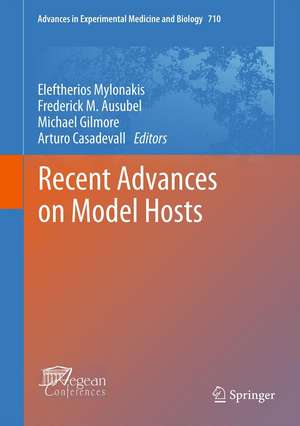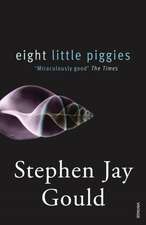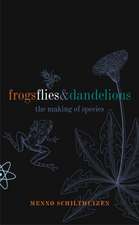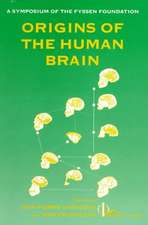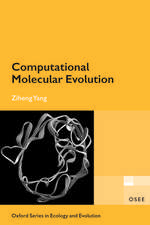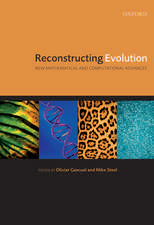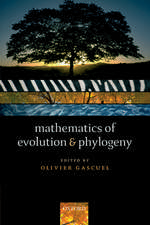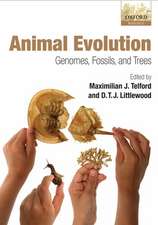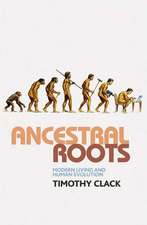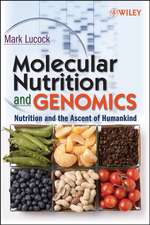Recent Advances on Model Hosts: Advances in Experimental Medicine and Biology, cartea 710
Editat de Eleftherios Mylonakis, Frederick M. Ausubel, Michael Gilmore, Arturo Casadevallen Limba Engleză Hardback – 16 noi 2011
This book provides a series of reports from the 1st International Conference on Model Hosts. This first of its kind meeting focused on invertebrate, vertebrate and amoeboid systems used for the study of host-pathogen interactions, virulence and immunity, as well as on the relevance of these pathogenesis systems and mammalian models. Importantly, a common, fundamental set of molecular mechanisms is employed by a significant number of microbial pathogens against a widely divergent array of metazoan hosts. Moreover, the evolutionarily conserved immune responses of these model hosts have contributed important insights to our understanding of the innate immune response of mammals.
This book provides a series of reports from the 1st International Conference on Model Hosts. This first of its kind meeting focused on invertebrate,vertebrate and amoeboid systems used for the study of host-pathogen interactions, virulence and immunity, as well as on the relevance of these pathogenesis systems and mammalian models. Importantly, a common, fundamental set of molecular mechanisms is employed by a significant number of microbial pathogens against a widely divergent array of metazoan hosts. Moreover, the evolutionarily conserved immune responses of these model hosts have contributed important insights to our understanding of the innate immune response of mammals.
| Toate formatele și edițiile | Preț | Express |
|---|---|---|
| Paperback (1) | 1186.86 lei 43-57 zile | |
| Springer – 23 aug 2016 | 1186.86 lei 43-57 zile | |
| Hardback (1) | 1180.07 lei 43-57 zile | |
| Springer – 16 noi 2011 | 1180.07 lei 43-57 zile |
Din seria Advances in Experimental Medicine and Biology
- 60%
 Preț: 316.29 lei
Preț: 316.29 lei - 5%
 Preț: 1091.25 lei
Preț: 1091.25 lei - 20%
 Preț: 691.93 lei
Preț: 691.93 lei - 5%
 Preț: 702.52 lei
Preț: 702.52 lei - 5%
 Preț: 702.52 lei
Preț: 702.52 lei - 5%
 Preț: 700.90 lei
Preț: 700.90 lei - 5%
 Preț: 701.80 lei
Preț: 701.80 lei - 5%
 Preț: 239.86 lei
Preț: 239.86 lei -
 Preț: 642.95 lei
Preț: 642.95 lei - 5%
 Preț: 820.42 lei
Preț: 820.42 lei - 5%
 Preț: 701.24 lei
Preț: 701.24 lei - 15%
 Preț: 627.29 lei
Preț: 627.29 lei - 15%
 Preț: 628.41 lei
Preț: 628.41 lei - 5%
 Preț: 1010.11 lei
Preț: 1010.11 lei - 5%
 Preț: 701.80 lei
Preț: 701.80 lei - 5%
 Preț: 702.71 lei
Preț: 702.71 lei - 20%
 Preț: 1138.16 lei
Preț: 1138.16 lei - 5%
 Preț: 1146.80 lei
Preț: 1146.80 lei - 18%
 Preț: 1097.18 lei
Preț: 1097.18 lei - 5%
 Preț: 1262.34 lei
Preț: 1262.34 lei - 5%
 Preț: 1141.07 lei
Preț: 1141.07 lei - 5%
 Preț: 1079.41 lei
Preț: 1079.41 lei - 18%
 Preț: 1100.89 lei
Preț: 1100.89 lei - 5%
 Preț: 1406.52 lei
Preț: 1406.52 lei - 20%
 Preț: 1022.93 lei
Preț: 1022.93 lei - 18%
 Preț: 927.20 lei
Preț: 927.20 lei - 5%
 Preț: 292.57 lei
Preț: 292.57 lei - 18%
 Preț: 938.22 lei
Preț: 938.22 lei - 18%
 Preț: 1210.67 lei
Preț: 1210.67 lei - 5%
 Preț: 1206.58 lei
Preț: 1206.58 lei - 5%
 Preț: 1266.09 lei
Preț: 1266.09 lei - 5%
 Preț: 1079.77 lei
Preț: 1079.77 lei - 18%
 Preț: 1109.85 lei
Preț: 1109.85 lei - 5%
 Preț: 1141.57 lei
Preț: 1141.57 lei - 5%
 Preț: 1389.69 lei
Preț: 1389.69 lei - 5%
 Preț: 1279.16 lei
Preț: 1279.16 lei - 18%
 Preț: 1388.96 lei
Preț: 1388.96 lei - 18%
 Preț: 1384.32 lei
Preț: 1384.32 lei - 24%
 Preț: 806.15 lei
Preț: 806.15 lei - 18%
 Preț: 1218.07 lei
Preț: 1218.07 lei - 5%
 Preț: 1400.44 lei
Preț: 1400.44 lei - 5%
 Preț: 1585.87 lei
Preț: 1585.87 lei - 5%
 Preț: 1278.66 lei
Preț: 1278.66 lei - 18%
 Preț: 1102.11 lei
Preț: 1102.11 lei - 5%
 Preț: 1075.31 lei
Preț: 1075.31 lei - 15%
 Preț: 636.73 lei
Preț: 636.73 lei - 5%
 Preț: 1075.31 lei
Preț: 1075.31 lei - 18%
 Preț: 926.63 lei
Preț: 926.63 lei
Preț: 1180.07 lei
Preț vechi: 1439.11 lei
-18% Nou
Puncte Express: 1770
Preț estimativ în valută:
225.84€ • 234.59$ • 187.59£
225.84€ • 234.59$ • 187.59£
Carte tipărită la comandă
Livrare economică 03-17 februarie 25
Preluare comenzi: 021 569.72.76
Specificații
ISBN-13: 9781441956378
ISBN-10: 1441956379
Pagini: 300
Ilustrații: VI, 136 p.
Dimensiuni: 178 x 254 x 15 mm
Greutate: 0.06 kg
Ediția:2012
Editura: Springer
Colecția Springer
Seria Advances in Experimental Medicine and Biology
Locul publicării:New York, NY, United States
ISBN-10: 1441956379
Pagini: 300
Ilustrații: VI, 136 p.
Dimensiuni: 178 x 254 x 15 mm
Greutate: 0.06 kg
Ediția:2012
Editura: Springer
Colecția Springer
Seria Advances in Experimental Medicine and Biology
Locul publicării:New York, NY, United States
Public țintă
Professional/practitionerCuprins
Amoeba Provide Insight Into The Origin Of Virulence In Pathgenci Fungi.- X Of Model Hosts and Man: Using Caenorhabditis elegans, Drosophila melanogaster and Galleria mellonella as model hosts for infectious disease research.- Caenorhabditis elegans as an Alternative Model to Study Senescence of Host Defense and the Prevention by Immunonutrition.- Bacterial effectors: learning on the fly. A Drosophila Asthma model - what it tells us the fly about inflammatory diseases of the lung.- Elucidating the in vivo targets of Photorhabdus toxins in real-time using Drosophila embryos.- Ecological niche modeling as a tool for understanding distributions and interactions of vectors, hosts, and etiologic agents of Chagas disease.- Where Simplicity Meets Complexity: Hydra, a Model for Host -Microbe Interactions.- Tick As A Model For The Study Of A Primitive Complement System.- Models Hosts For The Study Of Oral Candidiasis.- Creating a Pro-Survival and Anti-inflammatory Phenotype by Modulation of Acetylation in Models of Hemorrhagic and Septic Shock.
Textul de pe ultima copertă
Most studies of bacterial or fungal infectious diseases focus separately on the pathogenic microbe, the host response, or the characterization of therapeutic compounds. Compartmentalization of pathogenesis-related research into an analysis of the “pathogen”, the “host,” or the “antimicrobial compound” has largely been dictated by the lack of model systems in which all of these approaches can be used simultaneously, as well as by the traditional view that microbiology, immunology, and chemical biology and pharmacology are separate disciplines. An increasing number of workers from different fields have turned to insects, fish, worms and other model hosts as facile, ethically expedient, relatively simple, and inexpensive hosts to model a variety of human infectious diseases and to study host responses and innate immunity. Because many of these hosts are genetically tractable, they can be used in conjunction with an appropriate pathogen to facilitate the discovery of novel features of the host innate immune response.
This book provides a series of reports from the 1st International Conference on Model Hosts. This first of its kind meeting focused on invertebrate, vertebrate and amoeboid systems used for the study of host-pathogen interactions, virulence and immunity, as well as on the relevance of these pathogenesis systems and mammalian models. Importantly, a common, fundamental set of molecular mechanisms is employed by a significant number of microbial pathogens against a widely divergent array of metazoan hosts. Moreover, the evolutionarily conserved immune responses of these model hosts have contributed important insights to our understanding of the innate immune response of mammals.
This book provides a series of reports from the 1st International Conference on Model Hosts. This first of its kind meeting focused on invertebrate, vertebrate and amoeboid systems used for the study of host-pathogen interactions, virulence and immunity, as well as on the relevance of these pathogenesis systems and mammalian models. Importantly, a common, fundamental set of molecular mechanisms is employed by a significant number of microbial pathogens against a widely divergent array of metazoan hosts. Moreover, the evolutionarily conserved immune responses of these model hosts have contributed important insights to our understanding of the innate immune response of mammals.
Caracteristici
Provides a series of reports from the 1st International Conference on Model Hosts, the first meeting of its kind Focuses on invertebrate, vertebrate and amoeboid systems used for the study of host-pathogen interactions Full-color figures illustrate complex concepts
